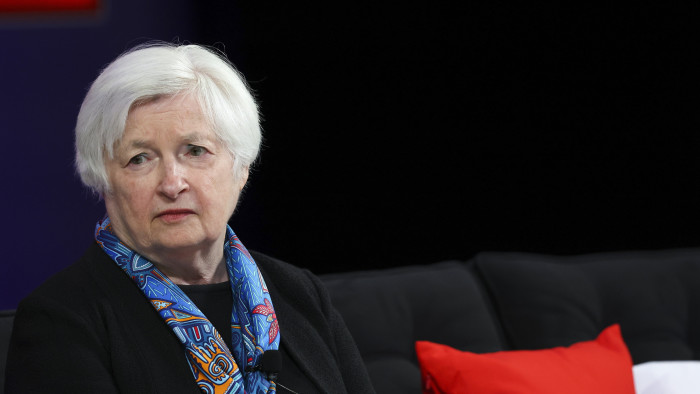National security reform increases costs for investors from US allies

Roula Khalaf, Editor of the FT, selects her favourite stories in this weekly newsletter.
Polarisation has defined American politics over the past decade. But one area where Democrats and Republicans have stood side by side is a growing concern about Chinese investment in the US.
The shared worry that Beijing-backed companies could be taking over strategic US assets has led to a rare bipartisan effort to empower the Committee on Foreign Investment in the US, an inter-agency panel that vets inbound investment for security risks, to deter unwanted transactions.
Bolstering Cfius, as the Treasury Department-led federal agency is commonly referred to, has allowed different US administrations to thwart deals that would have given Chinese companies access to critical data and technology that could potentially be used to harm the US.
The new barriers erected to protect US consumers and corporations have, however, made executing deals with companies from allied countries — including Japan, Britain and the Netherlands, three of the largest sources of foreign direct investment — more expensive and led to longer closing periods.
Cfius reviewed a record 436 transactions in 2021, according to its latest annual report. Most of the focus has been reserved for companies based in countries perceived as hostile to the US, including China and Russia. But allied nations that have operations in countries such as China and Russia are also being affected. Although deals are rarely blocked, approval periods have lengthened.
“The world has changed and the risk has changed over time,” says Ivan Schlager, a partner at law firm Kirkland & Ellis and a leading adviser to companies navigating the Cfius process. “So reviews are taking longer to start and the complexity both around technology and supply chain has increased even for friendly investors.”
Cfius was established in 1975 by President Gerald Ford as a defence mechanism to protect US companies from being taken over by, at first, sovereign funds of oil-rich countries and a little later by fast-growing Japanese conglomerates.
The committee, which in addition to the Treasury also includes members of the Departments of Defense, Homeland Security, State and others, has generally operated in obscurity, giving foreign investors little insight into its decision-making process. However, its main focus has been to block deals from a select batch of investors from hostile nations.
Under the more protectionism-prone administration of Donald Trump, Cfius was revamped and given greater powers to prevent a broader variety of transactions, including minority investments.
Trump’s 2018 Foreign Investment Risk Review Modernisation Act introduced for the first time a de facto mandatory review of foreign investments in US businesses that supply critical technologies to more than two dozen industries. Before the legislation, Cfius filings would mostly be voluntary.
The main target for Trump was Chinese companies trying to buy critical US technology, infrastructure and property close to military, air force and navy bases. During his time in office, Trump blocked Broadcom’s $142bn bid for the US chipmaker Qualcomm on the grounds that the then Singapore-based company had ties to China. He also pushed Cfius to shut down TikTok, the Chinese-owned video platform.
President Joe Biden, who beat Trump in 2020, has followed in his predecessor’s footsteps. He recently passed an executive order to deepen scrutiny of deals involving foreign investments in high-tech industries such as artificial intelligence, quantum computing and biotechnology.
Although Biden’s order did not single out any specific country, it highlighted that “some countries use foreign investment to obtain access to sensitive data and technologies for purposes that are detrimental to US national security” — a clear reference to China and Russia.
Aimen Mir, a former Cfius official and now a partner at law firm Freshfields Bruckhaus Deringer, says that, despite the greater scrutiny around critical industries, most transactions are concluded with few problems.
“The tough scrutiny that certain deals undergo shouldn’t be taken as reflecting the broader investment environment in the US,” Mir says.
Cfius, he adds, is “certainly more of a deal consideration” for investment banks and M&A lawyers than it was 10 years ago. “But I think it’s the rare instance, where it’s actually something that is preventing deals from going forward.”

This sentiment was echoed by Janet Yellen — who, as US Treasury secretary, chairs Cfius — in a statement on Biden’s September order. The move, she said, “highlights Cfius’s increasing attention to national security risks in several key areas . . . while maintaining the US open investment policy.”
Data show that Cfius’s tougher scrutiny is having the desired effect. Chinese companies’ investment has collapsed from $59bn in 2016 — a record year for foreign takeover deals in the US — to $4bn in 2021. Over the same period European companies have increased their overall investment from $248bn to $261bn.
Schlager says that in many ways Cfius has created an opportunity for buyers from US allies to take over assets that would have otherwise fallen into the hands of wealthier buyers based in more hostile countries.
“It’s true that it’s taking longer to get a deal done but it can get done,” he says. “What has changed is that you need strategic planning upfront before a transaction.”
Comments